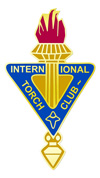
Club business meeting Minutes
11 October 2018
Guest Introductions- There were no guests at the meeting
Approval of minutes- The minutes from the September meeting were approved without correction.
Treasurer’s Report-
Balance in account as of 9/6/18 is $2,436.77
Payments
Atlas Coffee Mill (dinner 2 guests) $ 49.38
Pin Kristen Stahl $13.65
Receipts
Dues $695.00
Balance in account as of 10/6/18 is $3,068.74
Unfinished business
Reminder on dues: Dues are $70 a year for regular members, $45 a year for second member of household. Barb plans to pay IATC in January for members of record at that time. You may pay Barb for 2019 at any meeting this fall, please pay in full by the December meeting.
- Torch re-imbursement for convention- we have not been reimbursed for Donna’s attendance at the convention. Barbara will follow up with International.
New business
- Update on latest email correspondence regarding Torch elections- Paul explained that there were several emails regarding reported vacancy in the Vice-President position of Torch International. Paul will be following up with George Conklin, Torch International President, to understand the particulars and report back in November.
- Not discussed at the business meeting. Sue asked us about a wine and appetizers meal for the December meeting. We’ll discuss at the November business meeting.
- A question was asked regarding the publication of Torch magazine. Also, is Torch magazine available on-line. Barb or Paul to clarify in November.
- Several members of the club inquired about a book exchange. We’ll clarify a book exchange schedule in the November meeting.
Paper presentation- Kris Stahl’s paper Politics reflected on the life of Wisconsin governor Robert M. LaFollette, Sr. A summary of Kris’s paper is appended to these minutes.
Respectfully submitted,
Paul Freiberg, Club President
Synopsis Prepared By: Kris Stahl October 10, 2018
Robert M. La Follette, Sr. – A Man Worth Remembering
Robert M. La Follette, Sr. was born in 1855 and died in 1925. The years in between saw him grow from a hard working farm boy in western Wisconsin, near Madison, to a UW Law School graduate, to having a seat in Congress, to declining a powerful senator’s bribe, to being elected governor multiple times, to being elected senator multiple times, and finally, to making an independent race for president with his Progressive Party. La Follette was so extraordinarily energetic and had such a dominating personality that during his political career as a Progressive Republican, he became known as “Fighting Bob” La Follette. Coming from a large family that was adored by some and greatly disliked by others with elements of jealousy, greed, political maneuverings, fame, and recognition on the state and national levels, and the heights and depths of politics, La Follette left a legacy of Progressivism, the philosophy of which was moderation, pragmatism, non-doctrinaire and included agricultural, industrial, and intellectual elements.
He married Belle Case on New Year’s Eve 1881. She was the first female graduate of the University of Wisconsin Law School. Their daughters, Fola and Mary, became activists; their son, “Young Bob” became a U.S. Senator; and their son, Philip, became Governor of Wisconsin. Numerous other La Follette relatives, including cousins and nephews, also held distinguished government positions. Other relatives were activists, a journalist, and a painter. One La Follette descendant, Doug, is still involved in politics today as an incumbent running for the office of Wisconsin Secretary of State.
La Follette was concerned about the industrialization of the United States and supported domestic reform. His Progressive creed was to use governmental power to reduce the concentration of industrial and financial power, to regulate railroads, income tax, and to have a direct primary. He pushed through bills that provided for open primary elections, fair taxation, the safeguarding of natural resources from land-grabbers, and he created commissions to regulate banks, insurance companies, utilities, and railroads. His Progressive program in Wisconsin had political, economic, and social reforms which served as models for other states and the national government. The Progressives’ contributions through “insistence on sound, intelligent research, careful experimentation, and honest government” became known as “The Wisconsin Idea.” There has been intermittent interest in the Progressives since La Follette passed away, but it appears that the memory of Robert M. La Follette, Sr. and all that he accomplished is slowly fading from the public’s awareness. Rep. Berger’s quote at the time of La Follette’s death tells us why La Follette deserves to be remembered and recognized as one of the great leaders of our state and nation: “Robert Marion La Follette was a man of great industry, exceptional ability, honest motives, and had an unusually high sense of public duty. The world is better because he lived” (U.S. 69th Cong.)
Do you know Robert M La Follette?